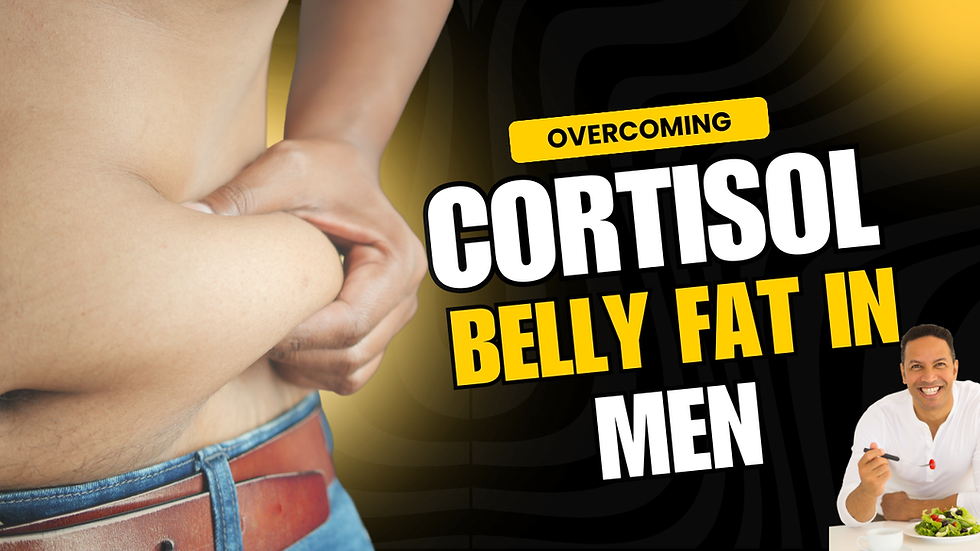Understanding and Overcoming Stress and Belly Fat in Men
- Brother Levon X

- Jan 18
- 4 min read

Stress—it can sneak up on the best of us. For men, especially, it often becomes a silent weight, piling on top of work responsibilities, family obligations, and the pressures of daily life. But what many don’t realize is that this stress, if left unchecked, can have very real and unhealthy effects on the body—particularly around the midsection.
Yes, that “treacherous belly fat” we sometimes see creeping in as we age isn’t just about poor diet. It’s often connected to something deeper: cortisol, the stress hormone. Let’s break it down and uncover how stress, diet, and a proactive lifestyle can make a world of difference.
The Cortisol Connection: How Stress Impacts Belly Fat
When your body is stressed, it releases cortisol into your bloodstream. This hormone plays a key role in your body’s fight-or-flight response, but when it’s constantly elevated due to ongoing stress, it can cause some problems.
Cortisol increases your blood sugar levels, which prompts your pancreas to release insulin. If this cycle continues unchecked, your body can become resistant to insulin. This means that excess glucose gets stored as fat—specifically around your midsection. This type of fat, called visceral fat, isn’t just something you see in the mirror. It’s dangerous because it surrounds vital organs like your heart, liver, kidneys, and lungs, making them work harder to function properly.
The Health Risks of Belly Fat
Belly fat isn’t just a cosmetic concern; it’s a health risk. Here are some of the dangers associated with it:
• Increased Risk of Cardiovascular Disease
• Higher Chances of Type 2 Diabetes
• Compression of Internal Organs
• Weakened Immune System
Visceral fat is especially harmful because it can lead to chronic inflammation, which is linked to various diseases. But the good news? It’s not permanent, and you can do something about it.
Find a Stress Outlet
Stress is inevitable, but how we manage it makes all the difference. Discover what works for you—whether it’s exercising, meditating, practicing breathing techniques, or simply spending time in a calm, positive environment.
Tip: Try diaphragmatic breathing. Inhale deeply through your nose for 4 seconds, hold for 7 seconds, and exhale slowly for 8 seconds. This simple practice can help calm your nervous system.
Clean Up Your Diet
What you eat plays a huge role in managing both stress and belly fat. High sugar, refined flour, and processed foods are not your friends. Instead, focus on whole, nutrient-dense foods like:
• Leafy greens
• Fresh fruits
• Lean proteins
• Whole grains
• Healthy fats like avocados
Consider intermittent fasting (eating one or two balanced meals a day) or adopting a vegetarian lifestyle. These approaches have been shown to lower insulin levels and help reduce belly fat.
Get Moving: Exercise doesn’t have to be complicated. Even walking a mile or two a week can make a significant difference. The key is consistency. Exercise reduces cortisol levels, increases testosterone, and strengthens your immune system.
Focus on Sleep: Lack of sleep exacerbates stress and belly fat. Aim for 7-9 hours of quality sleep each night to allow your body to reset and recover.
Why This Matters More as We Age
As men, we sometimes shrug off the changes in our bodies, telling ourselves it’s just part of getting older. But it doesn’t have to be that way. With age, we gain wisdom—and we can use that wisdom to make smarter choices for our health.
Imagine this: Losing the belly fat, seeing your energy levels soar, and feeling stronger both mentally and physically. By reducing stress and adopting a healthier lifestyle, you’re not just improving your present—you’re investing in your future.
A Call to Action
Men, it’s time to take control of our health. Stress and belly fat may be common, but they’re not inevitable. Let’s commit to small, sustainable changes that lead to big results. Whether it’s swapping out sugary snacks for a salad, taking a 20-minute walk, or practicing deep breathing when life gets overwhelming—every step counts.
Getting older doesn’t mean giving up. It means leveling up. Let’s be proactive, not complacent. Let’s take care of our bodies, manage our stress, and set the example for the next generation.
You deserve to live a long, healthy, and fulfilling life. The first step? Start today.
References
1. Epel, E. S., McEwen, B., Seeman, T., Matthews, K., Castellazzo, G., Brownell, K., & Ickovics, J. R. (2000). Stress and body shape: Stress-induced cortisol secretion is consistently greater among women with central fat. Psychosomatic Medicine, 62(5), 623-632.
2. The Endocrine Society. (2015). Stress and cortisol: The relationship to fat distribution. Available at: https://www.endocrine.org
3. Harvard Health Publishing. (2020). Why visceral fat is dangerous. Available at: https://www.health.harvard.edu
4. American Diabetes Association. Understanding diabetes and visceral fat. Available at: https://www.diabetes.org
5. Jerath, R., Crawford, M. W., Barnes, V. A., & Harden, K. (2006). Self-regulation of breathing as a primary treatment for stress reduction. Journal of Psychosomatic Research, 60(1), 35-45.
6. Nutrients. (2019). The effects of intermittent fasting on body fat reduction and metabolism. Available at: https://www.mdpi.com/journal/nutrients
7. USDA Dietary Guidelines for Americans, 2020-2025. Available at: https://www.dietaryguidelines.gov
8. Frontiers in Endocrinology. (2018). The effects of exercise on cortisol and body composition. Available at: https://www.frontiersin.org
9. Centers for Disease Control and Prevention. (CDC) Physical Activity Guidelines. Available at: https://www.cdc.gov
10. Sleep Foundation. (n.d.). How sleep impacts cortisol and weight management. Available at: https://www.sleepfoundation.org





Comments